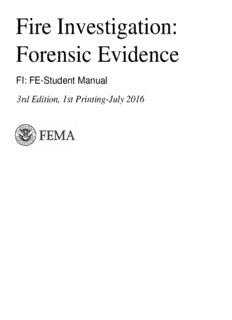
Forensic Evidence Collection - National Fire Academy downloads PDF
Preview Forensic Evidence Collection - National Fire Academy downloads
Fire Investigation: Forensic Evidence FI: FE-Student Manual 3rd Edition, 1st Printing-July 2016 3 r d E F E d itJFM ionulyI: FA/U , 1 2ES st P016-SMFA/N ri F n A t i n g F i r e I n v e s t i g a t i o n : F o r e n s i c E v i d e n c e Fire Investigation: Forensic Evidence FI: FE-Student Manual 3rd Edition, 1st Printing-July 2016 This Student Manual may contain material that is copyright protected. USFA has been granted a license to use this material only for NFA-sponsored course deliveries as part of the course materials, and it shall not be duplicated without consent of the copyright holder. States wishing to use these materials as part of state-sponsorship and/or third parties wishing to use these materials must obtain permission to use the copyright material(s) from the copyright holder prior to teaching the course. This page intentionally left blank. FIRE INVESTIGATION: FORENSIC EVIDENCE TABLE OF CONTENTS PAGE Table of Contents .............................................................................................................................................. iii Acknowledgments ............................................................................................................................................. v Course Goal ....................................................................................................................................................... vii Audience, Scope and Course Purpose ............................................................................................................... vii Grading Methodology ....................................................................................................................................... vii Schedule ............................................................................................................................................................ ix Firefighter Code of Ethics ................................................................................................................................. xiii A Student Guide to End-of-course Evaluations ................................................................................................. xv UNIT 1: COURSE OVERVIEW ................................................................................................... SM 1-1 Appendix: Forensic Evidence Collection Kit — Inventory Sheet 8/2/14 and Student Activity/Skills Assessment UNIT 2: COLLECTION AND ANALYSIS OF IGNITABLE LIQUIDS ................................. SM 2-1 UNIT 3: OTHER IGNITABLE LIQUID SAMPLING TOOLS ................................................ SM 3-1 UNIT 4: AN OVERVIEW OF THE ANALYSIS OF FIRE DEBRIS FOR IGNITABLE LIQUIDS .................................................................................................. SM 4-1 Appendix A: Comparing Gasoline to an Unknown Appendix B: Ignitable Liquid Classifications UNIT 5: COLLECTING FORENSIC EVIDENCE OTHER THAN IGNITABLE LIQUIDS IN FIRE SCENES .......................................................................................... SM 5-1 Appendix: Instructions for Use of Gypsum Products UNIT 6: POST-MORTEM AND TOXICOLOGY ...................................................................... SM 6-1 UNIT 7: SAMPLE PRESENTATION OF DOWNRANGE EXERCISE .................................. SM 7-1 Appendix A: Scenarios 1-4 Appendix B: Photo Log Appendix C: Evidence Transmittal Form UNIT 8: EVIDENCE AND THE ISSUES AFFECTING IT IN THE SCENE .......................... SM 8-1 UNIT 9: ESSENTIAL COMPONENTS OF A FORENSIC REPORT ...................................... SM 9-1 Appendices Acronyms iii FIRE INVESTIGATION: FORENSIC EVIDENCE This page intentionally left blank. iv FIRE INVESTIGATION: FORENSIC EVIDENCE ACKNOWLEDGMENTS The development of any National Fire Academy (NFA) course is a complex process aimed at providing students with the best possible learning opportunity we can deliver. There are many players in course development, each of whom plays an equally important part in its success. We want to acknowledge their participation and contribution to this effort and extend our heartfelt thanks for making this quality product. The following people participated in the creation of this course: Robert A. Neale Deputy Superintendent for Curriculum and Instruction U.S. Fire Administration, National Fire Academy Emmitsburg, Maryland Lee Vogtman Instructional Systems Specialist U.S. Fire Administration, National Fire Academy Emmitsburg, Maryland Danielle Jolly McKinley Group Instructional Designer Rockville, Maryland Carl Chasteen Chief of Forensic Services Havana, Florida Thomas Petty Senior Inspector/Outreach Coordinator/K-9 Handler Houston, Texas Jess Dunn Criminalist Iowa Division of Criminal Investigation Ankeny, Iowa Sharee Booke Wells, M.S., F-ABC Lab Director/Senior Forensic Scientist Forensic and Scientific Testing Thorsby, Alabama v FIRE INVESTIGATION: FORENSIC EVIDENCE This page intentionally left blank. vi FIRE INVESTIGATION: FORENSIC EVIDENCE COURSE GOAL The goal of this course is to provide students with the knowledge and tools used to identify requirements for the “Fire Investigation: Forensic Evidence” (FI: FE) course (R0214). FI: FE is a six-day, intermediate-level course that addresses the critical skills essential to the effective collection, packaging, preservation, processing and testing of evidence from a fire and/or explosion scene. This course uses state-of-the-art techniques, practices, protocols and standards for both the investigator and the laboratory scientist, ensuring legally defensible evidence presentations in a court of law. This course also addresses the interaction and collaboration between fire/arson investigators and laboratory scientists. This partnering encourages collaborative efforts of the entire investigative community involved in all aspects of evidence from fire and explosion incidents. AUDIENCE, SCOPE AND COURSE PURPOSE This course is designed to better prepare federal, state and local fire service and law enforcement personnel to apply FI: FE principles and practices to effectively identify, document, collect and submit evidence for laboratory analyses to support their arson cases in court. It will also provide necessary knowledge regarding the use of outside resources and the proper presentation of cases that are based on physical evidence other than ignitable liquid (IL) evidence. Students should have completed “Fire Investigation: Essentials” (FI: E) course (R0206) or an equivalent as approved by the training specialist. GRADING METHODOLOGY Final examinations will be administered for the purpose of gauging knowledge gained. Upon completion of the course, credit will be notated in the Federal Emergency Management Agency (FEMA) Knowledge Center. vii FIRE INVESTIGATION: FORENSIC EVIDENCE This page intentionally left blank. viii
Description: